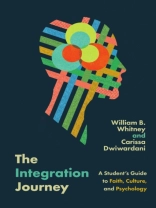There are numerous models, theories, and resources on integrating psychology and the Christian faith. But practicing integration in the real world is something else entirely. To move from theory to practice, we need learning informed by experiences, reflection on those experiences, and feedback from others. This integration process is a lifelong journey.
William B. Whitney and Carissa Dwiwardani offer a fresh approach to integration as embodied, lived, and practical. These two seasoned teachers guide students through the process of theological reflection on psychology as part of their spiritual formation and vocation, requiring each person to incorporate their own stories, culture, and experiences. True integration, the authors contend, should work for justice in our churches, communities, and wider society, with particular attention to the marginalized and oppressed.
Using guided exercises and prompts for reflection and discussion, The Integration Journey invites students to make their own contributions to constructing a culturally informed, organic model of integration that works for them. The goal of integrative reflection is ultimately to be shaped so that we can better love God and others and work toward God’s kingdom here on earth.
विषयसूची
Acknowledgments
1. Introduction to Integrative Reflection and Formation
2. Integration as Story
3. Love and Justice: A Theological Framework for Ethical Action and Cultural Awareness Within Integration
4. Integration Is Culturally Embedded
5. The Cycle of Transformation: Developing Our Integrative Identity
6. Honoring Cultural and Communal Wisdom
7. Holding Space for Lament in the Face of Injustice
8. Reflection, Action, Vocation: Finding Your Integrative Voice
Bibliography
General Index
लेखक के बारे में
Carissa Dwiwardani (Ph D, Rosemead School of Psychology) is professor of psychology at Biola University’s Rosemead School of Psychology. She is a licensed psychologist who is board certified in clinical psychology (ABPP).












